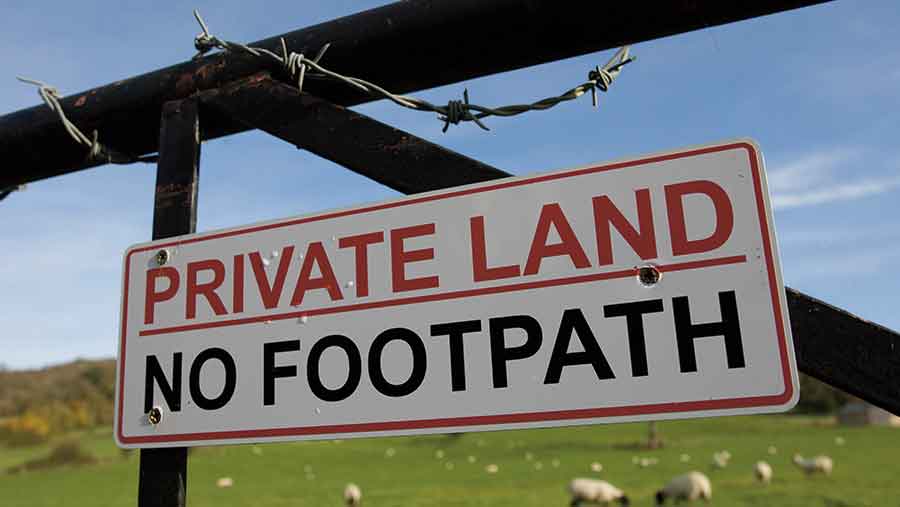Private land deals rise as uncertain farmers test market
The amount of land entering the market privately has spiked in some regions as farmers look to test the autumn market without drawing attention.

© Photofusion/Rex/Shutterstock
Amid Brexit uncertainty and lower commodity prices, some agents report a growing acreage for sale privately, along with heightened interest from prospective sellers who are keen to understand their options.
Ben Taylor, partner at Bidwells, said selling land privately seemed to be “in vogue”, due to the potential for different outcomes of a sale.
See also: Coping with low prices – German farmers tell their stories
But the picture varies across the UK with many agents advising clients to find their land’s true value by selling publicly.
Charlie Evans, Strutt & Parker’s head of farm agency in south-west England, said he had 2,385 acres across 10 farms available privately this autumn, compared with four farms comprising 864 acres this time last year.
“Some people are thinking they don’t want to lose the impact of their farms in the market through a public launch if it turns out the market is weak (post-Brexit), so this is a way to test the market discreetly,” he said.
“I also think [that in] the current climate, in terms of profitability, some have decided if they can get a good price for their farm they will sell, but don’t want to alert neighbours, suppliers or staff to the fact they are open to leaving the industry.”
A South-West trend?
David Hebditch, head of rural at Somerset-based Humberts, said in the past 12 months about 35-40% of sales were being done in private – up 10 to 15 percentage points.
He added that most off-market deals involve large estates at the top end of the market and tend to not affect bare blocks or small farms.
“Selling privately allows buyers and sellers flexibility to negotiate terms such as sale and leaseback or periods of holdover, which aren’t always available with a public sale,” he said.
But George Alder, a partner at Stags which operates in Dorset, Devon and Cornwall, said most of his clients still preferred to sell publicly.
“Some people are nervous buying off market because they don’t know if they’re paying a fair price – no-one quite knows where the value lies,” he told Farmers Weekly.
Further east, Symonds & Sampson partner Andrew Tuffin, said: “I am involved in some off market deals but I would not say they are necessarily increasing.
“Demand and prices are remaining strong in Wessex, which is largely down to poor supply, therefore more often than not we still advise public marketing.”
The national picture
Private sales have traditionally been preferred by high-profile buyers and sellers, and by those who have sensitive reasons for sale such as divorce or financial difficulty.
But James Prewett, Knight Frank’s head of regional farm sales, said he had noticed a variety of sellers interested in using a private launch to test the market.
“I think more smaller scale farms or lots between 60 acres and 150 acres are trading privately than previously,” he said.
“It’s a case of people wanting to understand their position in the market post Brexit, so more sellers are keen to begin with a quiet private launch to gauge interest.”
An acreage equivalent to about one-third of publicly marketed land is estimated to sell privately each year.
But in 2013, more than 65% of farms and land handled by northern agent George F White was sold off market.
“Across North Yorkshire we are now seeing about 20% of land and farms sold privately,” said Matthew Brown, a rural practice surveyor at the company.
“Dealing privately can cut out advertising costs and be more convenient, and with some properties, sellers prefer not to go public for a variety of reasons.”
Harry Baines, a land agent at East Midlands-based Shouler & Sons, said: “I feel it is much harder now than 12 months ago to advise a vendor what the market value of land is without properly testing it on the open market.”
Off-market estate sales in Scotland rise
In Scotland, CKD Galbraith said more private deals are being done in the estates market than the farmland market.
“More estates are available and selling privately than farms and actually the farm market still benefits from public exposure rather than private placement,” said valuer Simon Brown.
Alex Lawson, national farms and estates director for Savills, added: “You can never be certain than you haven’t missed the best buyer in the market. Sometimes these properties can appeal to someone who may not actually be looking.”
Selling land privately – the pros and cons
Expert view: Robert Fairey, Brown & Co’s head of farm agency
Benefits
- Privacy – high profile or sensitive sales can transact behind closed doors
- Securing a premium – in certain circumstances buyers may pay a premium for exclusivity
- Flexibility – dealing with a single buyer can allow for flexibility when negotiating terms and conditions of a deal
- Cost-saving – advertising and promotional costs are cut for the seller and this may mean the sale process is quicker
Drawbacks
- Interest – only a small number of people know about the sale
- Market value – sellers will never know if another buyer would have paid more
- Saturation – for sellers planning to go to the open market if a private launch fails, potential buyers may have already been approached
